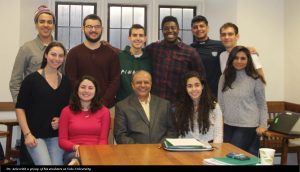From Sanaa University to the University of Michigan to Yale, Dr. Muhammad Aziz has bridged languages and cultures, learning English and teaching Arabic while researching and contributing to a better understanding of Sufism, a mystical branch of Islam.
Woodhaven, Connecticut:
The Yemeni American News

Aziz says he had wanted to move to the United States since 1982, after he finished English language courses in the United Kingdom. A failure to secure a scholarship led him back to Yemen where he studied English literature and got a job as a translator. However, he had not given up on his American dream. He knew his skills would be put to a more productive use in US academia.
In 1995, he secured a scholarship at the University of Michigan through AMIDEAST, an educational nonprofit that seeks to increase understanding between the US and the Middle East.
He says he was impressed with US society and development when he first moved. But his biggest transformation was moving from hanging out at cafes to the world of research and libraries.
After earning a master’s in Near East studies, he concluded his PhD dissertation “Medieval Sufism in Yemen: The Case of Ahmad Ibn Alwan” under the direction of Professor Alexander Knysh.
While his research had focused on Sufism, with Knysh’s advice, Aziz wanted to tackle an under-researched subject in writing his dissertation about the Yemeni Sufi scholar Ahmad Ibn Alwan.
Sufism is not a sect, but rather a way of adding a deeper level of spirituality to existing Islamic schools, Aziz explained.

However, Sufis are often questioned about the authenticity of their faith by conservative scholars, and criticized by fundamentalists for some of their practices, including praying at the tombs of revered scholars. They have been targeted by extremists.
ISIS terrorists killed more than 300 people at a Sufi mosque in Egypt last year.
Upon earning his PhD, Aziz taught at Princeton for one year. He is now a professor at Yale University, one of the eight prestigious Ivy League schools in the US.
We asked the professor a few question about Sufism and its place and perception in Islam.
How do you envision the Sufis and Sufism?
Sufism is a way that addresses the spiritual dimension of Islam… The Prophet said that faith (Ihsan) is to worship God as though you are seeing Him, and if you cannot see him, he sees you…The Sufis point out that this means the stage of direct witnessing (mushahada) and the stage of vigilance (muraqaba).
Where do you find the Sufi order among the juristic schools?
It is possible for the Sufi to be in any Islamic school or juristic approach, and the difference is that the person can add the spiritual dimension to the Islamic law as represented by the Quran and the sayings (sunna) of the Prophet.
What about the tomb supplication?
Supplication at tombs does not lead to polytheism (shirk) as perceived by some. Supplication is permissible in Islamic law because God accepts the intercession (shafa’a) of the prophets and messengers. This means that people do not address God directly, but through the prophets or chosen ones (awliya’) since these are closer to God than any ordinary person.
Thus, visiting the tombs of the righteous people must be understood accordingly. There are some who consider supplication as heresy. However, the reality is that people come to the tombs of pious people only because of their proximity to God due to their good deeds. But, we should not take this point as a matter of argument or debate. Our focus should be on the Sufi order and what it brings with it generally.
In your opinion, who are the main Sufi scholars today?
They are numerous, and we believe – leaving the final decision to God – that among them are sheikh Umar b. Hafiz and Ali al-Jifri from Hadramawt, and sheikh Abdussalam Muhammad al-‘Awadi from Ibb, Sheikh Muhammad Hashim al-Kabbani from the US; The best of these is the deceased sheikh Muhammad Bal-Qaid al-Tilmisani and his most important follower sheikh Muhammad Mutwally Al-Sha’rawi… One of the best book that tackles the topic of Sufi orders is written in English by Spencer Trimingham and is called: The Sufi Orders in Islam.
How do you see the future of Sufism despite the stigma and misinformation around it?
We must correct the misconceptions and inform people who receive their information from unreliable sources. This misinformation has a negative role in distorting the public awareness of the Sufi thought. This requires efforts of those who believe in the cause of Sufism as a spiritual order.
Why is the Hadramawt Sufism prominent? And Why did it not export its teaching to the world?
The province of Hadramawt was able to preserve the moderate way of Islam that is based on the spirit of the Quran and the sunna. Hadramawt did not export its Sufism because the opposing centers, founded on misconceptions by people with financial means, stood firmly against the Sufi order.
The Hadramawt Sufi order is based on the true understanding of the spirit of Islam. The Dar al-Mustafa is still a major spring of knowledge that is based on the true understanding of Quran and the sunna of the Prophet, may God grant him blessing and peace.












